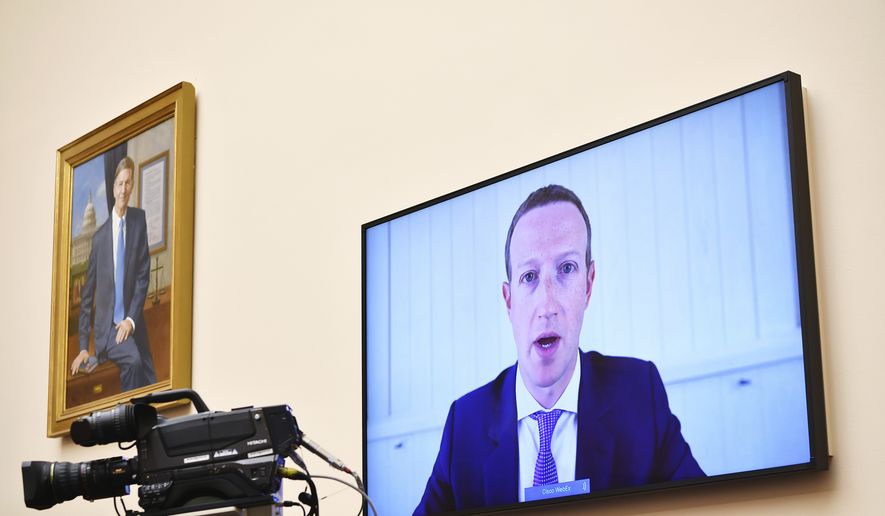The Senate Judiciary Committee on Thursday authorized subpoenas for Twitter CEO Jack Dorsey and Facebook CEO Mark Zuckerberg to compel testimony about their companies’ blocks of news reports about the Hunter Biden email scandal that threatens his father’s presidential run.
The committee voted 12-0 to authorize the subpoenas. None of the committee’s Democratic senators was present because they were boycotting a separate committee vote on Supreme Court nominee Judge Amy Coney Barrett.
Judiciary Committee Chairman Lindsey Graham, South Carolina Republican, said he would not allow the Democrats’ absence to interrupt his effort to force the social media titans to testify.
“I’ve been asked by my Democratic colleagues to hold it over, and I think there’s a lot of interest on the other side of getting some of the social media folks here to answer questions about their platforms, so I’m going to move forward with the request today for the subpoena,” Mr. Graham said. “Hopefully, get us some leverage to secure their testimony.”
The forthcoming subpoenas want testimony on the “suppression and/or censorship” of two New York Post articles involving a son of Democratic presidential nominee Joseph R. Biden, on information about the company’s content moderation practices, and on other instances of Facebook and Twitter limiting the visibility of material online, according to the motion introduced by Mr. Graham.
A date has not been set for testimony from Mr. Zuckerberg and Mr. Dorsey, but it is anticipated to be scheduled before the Nov. 3 elections.
The Senate Commerce, Science and Transportation Committee has scheduled a Wednesday hearing with Mr. Dorsey and Mr. Zuckerberg, alongside Google CEO Sundar Pichai, on whether to revoke Big Tech’s sweeping immunity from liability for users’ online posts.
The value of two hearings with the heads of Facebook and Twitter may not be in new policies, but in providing an opportunity for Republican senators to bypass social media restrictions to communicate directly with Americans from the hearing room.
Some tech policy experts say the elections may matter more for new federal policies affecting Facebook and Twitter than whatever happens at a hearing.
“Clearly, members of Congress are frustrated with tech executives, for different reasons, and this hearing will be an opportunity to express that frustration,” Jesse Blumenthal, Charles Koch Institute director of technology and innovation, said in an email. “That being said, given all that Congress has on its plate and the fact that we’re less than two weeks from an election, I’m not sure how much of a short-term impact this will have. Longer term, I think the results of the election will shape the policy discussion next Congress more than any one hearing.”
Ryan Calo, a University of Washington law professor, said subpoenas and hearings are more about influencing public opinion than enacting policy.
“I see the subpoenas as political theater,” Mr. Calo said. “My sense is that this posturing will begin to disappear after the election, regardless of who wins.”
Sen. Ted Cruz, a Texas Republican on both the commerce and judiciary committees, told reporters this week that he was determined to see Mr. Zuckerberg and Mr. Dorsey testify before Election Day.
Facebook and Twitter declined to comment on the subpoenas, but Facebook took action to distance its executives from specific content enforcement decisions.
Facebook’s new oversight board charged with policing those decisions announced that it began accepting cases for review. The 20-member board is technically separate from Facebook and is organized as a limited liability company that operates with a $130 million trust fund provided by the company.
“From today, if your content is removed from Facebook or Instagram and you have exhausted the company’s appeal process, you can challenge this decision by appealing to the Oversight Board,” the oversight board said on its website. “Similarly, Facebook can now refer cases for a decision about whether content should remain up or come down. In the coming months you will also be able to appeal to the board about content you want Facebook to remove.”
Whether the board will adjudicate any users’ appeals before the Nov. 3 elections is not clear. The oversight board’s website said it expects to decide cases and have Facebook take action on its decisions “within a maximum of 90 days.”
The oversight board’s announcement emphasized that all of its decisions will be binding for Facebook, and the board said it intends to announce details on the first cases it will review in the coming weeks.
• Ryan Lovelace can be reached at rlovelace@washingtontimes.com.




Please read our comment policy before commenting.